On October 1, 1924, newborn James Earl Carter Jr. was destined to become the first U.S. president to be born in a hospital.
In the spring of 1966, Carter became the son of one of the oldest mothers to join the Peace Corps, 68-year old Lillian.
In 1973, Georgia Governor Carter went to New York to appear on the popular television show, What’s My Line; the panel was unable to ascertain his occupation. In the early stages of Carter’s campaign for the presidency in 1976, Newsweek magazine dubbed his volunteers the “Peanut Brigade.”
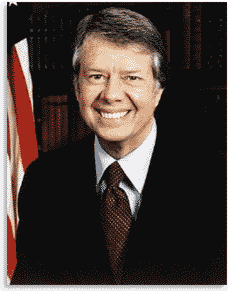 In the early Fall, Carter made his notorious confession in a Playboy magazine interview, saying he had “lusted after women in my heart.” Carter’s opponent in the presidential election was then-President Gerald R. Ford who, in October as the election neared, claimed that there was “no Soviet domination” in eastern Europe. That statement played a major role in Ford’s failed attempt to capture the presidency outright, after the impeached President Richard M. Nixon resigned amid the Watergate Scandal.
In the early Fall, Carter made his notorious confession in a Playboy magazine interview, saying he had “lusted after women in my heart.” Carter’s opponent in the presidential election was then-President Gerald R. Ford who, in October as the election neared, claimed that there was “no Soviet domination” in eastern Europe. That statement played a major role in Ford’s failed attempt to capture the presidency outright, after the impeached President Richard M. Nixon resigned amid the Watergate Scandal.
The early years< br> Immigrants from England, the Carter family had lived in America for nearly 300 years and Georgia for nearly half that time when Jimmy Jr. was born, the first of four children, in Plains.
After an uneventful childhood, Carter attended Georgia Southwestern College and Georgia Institute of Technology for one year each, before being accepted into the U.S. Naval Academy in 1943. As an ensign in 1946, Carter was assigned to the USS Wyoming, an old battleship converted into a testing facility for new electronics and gunnery equipment.
Before his naval career ended, Carter would serve on the battleship USS Mississippi and the submarine USS Pomfret. He was then assigned to work on the precommissioning detail of the USS K-1, the first submarine to be built following World War II.
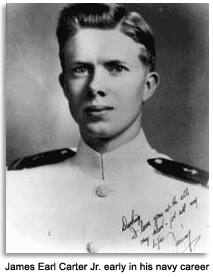 Carter then requested to be in Captain Hyman Rickover's nuclear-powered submarine program. As he prepared to become the engineering officer aboard the USS Seawolf, one of the first atomic powered submarines, his father fell ill and died, in July 1953.
Carter then requested to be in Captain Hyman Rickover's nuclear-powered submarine program. As he prepared to become the engineering officer aboard the USS Seawolf, one of the first atomic powered submarines, his father fell ill and died, in July 1953.
Carter resigned his commission to return to the family farm in Plains.
Early political years
Like many civic minded citizens, Carter desired to exert an influence on the betterment of his community and state. He began by serving on the school board, then moved on to the state senate in the 1960s. Carter then ran a successful campaign for governor of Georgia in 1970.
When the Democratic primaries rolled around in 1976, Carter was given the proverbial snowball’s chance in Hades of outlasting the "good ol’ boy network" of better-known politicians centered in the nation's capital.
The political climate, however, was in his favor. Thanks to memories of the Watergate Scandal, a house-cleaning Washington D.C. outsider was a welcome relief in the minds of many voters.
After declaring his candidacy for the presidency, Carter won the Iowa caucuses and the New Hampshire primary in February. His victories were followed by wins in Florida and Illinois, his first success in a northern industrial state. That provided the momentum for his eventual nomination by the Democratic Party and election by the voters.
The presidency
The fledgling president was off and running after his election. During the Inauguration Day parade, he and First Lady Rosalynn Carter got out of their limousine to walk down Pennsylvania Avenue, much to the crowd's delight and the Secret Service's distress.
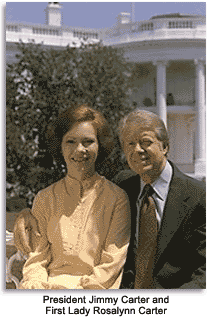 The following day, Carter issued a pardon to all those considered to be "draft dodgers" during the Vietnam War. About two weeks later, he delivered his first speech on national television to promote a national energy policy.
The following day, Carter issued a pardon to all those considered to be "draft dodgers" during the Vietnam War. About two weeks later, he delivered his first speech on national television to promote a national energy policy.
In early March, Carter began a series of White House talks with leaders from the Middle East, the first being Israeli prime minister Yitzhak Rabin. That meeting was quickly followed by visits from Egypt, Jordan, Saudi Arabia, and Syria. This started successive attempts by every president since then to broker peace in the Mid-East.
In dealing with the arms race with the Soviet Union, Secretary of State Cyrus Vance was rebuffed in his bid to further ease tensions between the two superpowers. SALT II remained in limbo, which prompted Carter to call for a three percent hike in NATO member nation defense budgets.
In June 1977, Carter angered conservative "hawks" by canceling the B-1 bomber project, an apparent contradiction to his call for increased defense budgets. In September, he signed over U.S. control of the Panama Canal to the Panamanian government, beginning in 1999.
The first bump in the presidential road occurred when Bert Lance, Carter's friend and budget advisor, was called before a Senate committee to confront charges that he used his position for personal gain. The affair embarrassed Carter, in part because he ran his campaign for the presidency on taking the high road regarding ethics.
International diplomacy took center stage when Egyptian president Anwar Sadat made a historic visit to Israel in November 1977, which advanced the promise of peace in the Middle East. Israel's prime minister Menachem Begin reciprocated the gesture in late December.
On a New Year's Eve visit to Tehran, Iran, Carter toasted Shah Mohammed Reza Pahlavi as "an island of stability" amid the turmoil of the region.
In February 1978, a poll disclosed that Carter's job performance rating for good or excellent had slipped 21 percent to a paltry 34 percent among those surveyed. In July, Democratic Senator Edward Kennedy blasted the president for a "failure of leadership," regarding differences over a national health care proposal.
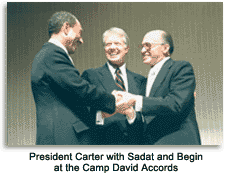 On a positive note, the historic Camp David Accords, signaling a major step toward peace in the Middle East, were signed in September by Begin and Sadat.
On a positive note, the historic Camp David Accords, signaling a major step toward peace in the Middle East, were signed in September by Begin and Sadat.
Late in the year and early 1979, a flurry of activity ensued on the international scene: It was announced that relations with the People's Republic of China would be normalized; the deposed Shah of Iran flew into exile on his private jet, while the Ayatollah Khomeini returned from expatriation to lead the country; and Carter traveled to the Middle East to try to preclude the dismantling of the Camp David Accords; the dramatic signing of the Egypt-Israel Peace Treaty took place on the White House lawn.
A national scare was set off in March when the Three Mile Island nuclear power plant sustained an accident in one of its reactors. President Carter, tapping his experience with nuclear power plants on submarines, assessed the damage at the Middletown, Pennsylvania, facility, then allayed locals' fears with a short speech. Shortly thereafter, some 65,000 marching people demanded that all of the nuclear power plants in the U.S. be shut down.
In June, Carter and Soviet Union premier Leonid Brezhnev signed the SALT II arms control treaty in Vienna.
Back on the home front, a simmering energy crisis came to a head. Rising oil prices set off the nation's first energy riot when truckers staged a blockade of freeway exits in Levittown, Pennsylvania, which resulted in two days of violence, 100 people injured, and 170 arrested. Interest rates floated at historic levels, which contributed to a savings and loan crisis. Unemployment was high. Stagnant economic growth combined with high inflation inspired the term "stagflation."
On July 15, Carter delivered his most important — if not most reassuring — address. In what became known as the "malaise" speech (although Carter did not use the word "malaise" in the speech), Carter acknowledged that the past 15 years of assassinations, [1959;Vietnam], the Watergate Scandal, and a declining economy caused in part by the energy crisis, had driven Americans to a "crisis of confidence." He said:
Ten days ago, I had planned to speak to you again about a very important subject -- energy. For the fifth time I would have described the urgency of the problem and laid out a series of legislative recommendations to the Congress. But as I was preparing to speak, I began to ask myself the same question that I now know has been troubling many of you: Why have we not been able to get together as a nation to resolve our serious energy problem?In a speech that sounded more like a sermon, Carter praised nation's history of "hard work, strong families, close-knit communities, and our faith in God," but admonished Americans for their habits of "self-indulgence and consumption."
Higher poll ratings for Carter followed, perhaps with the nation appreciating his openness and candor.
But the speech seemed to backfire with the media, which averred that there was nothing wrong with the American people — it was the White House that needed fixing. Two days after the speech, Carter asked for the resignations of his entire cabinet. He eventually accepted five, including Energy Secretary James Schlesinger, and Joseph Califano, the Secretary of Health, Education, and Welfare.
Carter now suffered from bad decisions and failure to decide. In September, Nicaraguan Daniel Ortega, leader of the Sandinista rebels who had just overthrown the dictatorship of Anastasio Somosa, came to the White House for aid. Carter agreed on $118 million. Ortega subsequently turned his organization into a leftist regime.
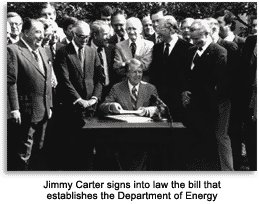 In October, Carter allowed the Shah into the U.S. for medical treatment. That was an affront to militant "students" in Iran, who, on November 4, seized 66 hostages after overrunning the U.S. Embassy — igniting a 444-day hostage crisis. Two days later, Senator Kennedy announced his candidacy for the Democratic nomination for president.
In October, Carter allowed the Shah into the U.S. for medical treatment. That was an affront to militant "students" in Iran, who, on November 4, seized 66 hostages after overrunning the U.S. Embassy — igniting a 444-day hostage crisis. Two days later, Senator Kennedy announced his candidacy for the Democratic nomination for president.
Two weeks into the seige, 13 hostages, all female or black, were released. On Christmas Day, the Soviets invaded Afghanistan, provoking the tabling of the SALT II Treaty and leading to a proclamation of the "Carter Doctrine," a warning to the Soviets that, if they invaded the Middle East, it would be taken as a "direct threat to U.S. national security."
In mid-February 1980, Carter urged a boycott of the Summer Olympics, which were to be held in Moscow.
In late April, in a bold, but fatal decision, Carter opted for a rescue mission of the hostages. The operation, dubbed "Desert One," was a mortifying debacle as two helicopters failed and a third crashed into a plane on takeoff. Altogether, eight men lost their lives, and eight aircraft went down.
Other than the Mount St. Helens Eruption in Washington state on May 18 and the Republican convention nominating Ronald Reagan, all was quiet on the home front until early August, when the "Billygate" controversy exploded.
The president's brother, Billy, entangled himself in a bit of international intrigue when he and a group of Georgia businessmen and political figures went to Libya to try to establish trade relations. Libya was known to support terrorists, so the meeting was frowned upon by the White House.
Jimmy Carter explained to the American public that "I have no control over what my brother says, and my brother has no control over me."
Part II of the scandal was brought to light when it was discovered Billy had received a $220,000 "loan" from the Libyan government for "oil sales he was supposed to facilitate."
That came at an inopportune time — the campaign season — and the Republicans made the most it.
In November, the Iranian government announced that the hostages would not be released prior to the election, which sealed the president's fate. Carter lost to Reagan in a landslide.
The post-presidential years
Moments after Reagan took the oath of office, the hostages were released. Reagan asked Carter to greet the hostages in Germany.
In August and September, respectively, Carter entertained Sadat and Begin at his home in Plains. Sadat was assassinated two months after his visit.
The ex-president kept busy by planning the Carter Center; dedicating himself to "waging peace, fighting disease, and building hope;" teaching at Emory University in Atlanta; and writing his memoirs. "Keeping Faith" appeared on bookstore shelves in October 1982.
After suffering through the deaths of his sister, then his mother, Carter became involved in "Habitat for Humanity," in 1984. He and Rosalynn donated one week each year to help build houses with families in need of shelter. The effort of HFH has resulted in the building of more than 35 million homes around the world.
Jimmy and Rosalynn Carter stay active in international goings on, such as monitoring foreign elections, writing (their book, Everything to Gain: Making the Most of the Rest of Your Life, which remained on the New York Times bestseller list for 10 weeks); serving as co-chairmen of the NAFTA Commission, and tirelessly promoting human rights.
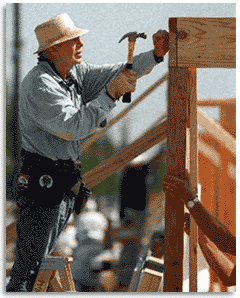 In December 1998, Jimmy Carter received the first Human Rights Prize awarded by the United Nations. In August 1999, the Carters were presented with America's highest civilian honor, the Presidential Medal of Freedom, by President Bill Clinton. In October 2002, the former president received the Nobel Peace Prize for hs "decades of untiring efforts to find peaceful solutions to international conflict." Carter became the third U.S. president to receive the honor. Theodore Roosevelt and Woodrow Wilson were the others.
In December 1998, Jimmy Carter received the first Human Rights Prize awarded by the United Nations. In August 1999, the Carters were presented with America's highest civilian honor, the Presidential Medal of Freedom, by President Bill Clinton. In October 2002, the former president received the Nobel Peace Prize for hs "decades of untiring efforts to find peaceful solutions to international conflict." Carter became the third U.S. president to receive the honor. Theodore Roosevelt and Woodrow Wilson were the others.
Jimmy Carter is currently the oldest living former president and the longest-lived. Carter lives in Georgia with his wife, Rosalynn.